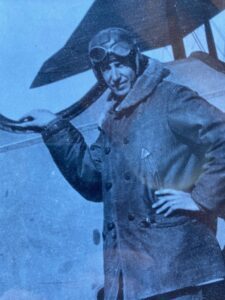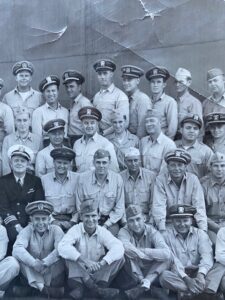To appreciate this true story, you need to know a bit about my Aunt Lois. Now in her 90s, Lois is a Vermonter through and through, as down to earth…
To appreciate this true story, you need to know a bit about my Aunt Lois.
Now in her 90s, Lois is a Vermonter through and through, as down to earth as any person you’ve ever met, and not one to make things up. Although she spent her teenage years in Belmont, Massachusetts, she’s really a Vermonter, having raised my three cousins in Windsor, Vermont, and in the summer joining my family at our shared farm in Westmore, hidden in the far reaches of the state known as the Northeast Kingdom; a place befitting its name, with thousands of acres of dense forest, open farmlands with grazing cows, and Lake Willoughby — a five mile stretch of starkly cold water surrounded by rock-ribbed mountain cliffs that hug the shore.
It’s a place without pretense, where the 30-pound trout pulled up from the ice holes in January are in fact 30-pound trout, with no need for exaggeration.
And so it is with Lois. She just tells it like it is. I picture Lois now down by the lakeshore on a late summer day, the wind blowing in from the South to make the white-topped waves roll and rumble against the beach. Lois’ face is long and deeply lined, her fingers twisted by arthritis into bony branches of an apple tree as she gesticulates to make her points. When she starts to tell the story, she’s transformed in my mind to how she was in 1939, tall and beautiful with long wavy red hair.
Lois was in her senior year of high school, and friends with a boy a little older than her. His name was Willard Haskell. Lois had a feeling he was “sweet on her,” but he was shy; somehow he’d never managed to ask her out. When the Second World War began, however, Willard found the courage to enlist in the Air Force. He’d always wanted to be a pilot and this was his chance. The only problem was that Willard wasn’t good at math, and he was worried he wouldn’t pass the tough air force exam. He turned to Lois for help and she tutored him for months. It worked. Willard got into the air force and was shipped off to England. Lois and Willard exchanged a few letters, but gradually they lost touch as the war stretched on into years.
Then one night in early summer as Lois slept in the farmhouse just up from the shores of Lake Willoughby, she had a vivid dream.
She was standing on the roof of Belmont High School, looking up, and the entire sky as far as the eye could see was full of American bombers, their wings tip to tip, sheet metal rivets gleaming in the early morning light. And there, leaning out the cockpit window of one bomber, was none other than Willard Haskell. He was smiling at her, and waving, his long red scarf fluttering behind. The world shook from the roar of the engines, so intense Lois could feel the roof beneath her bare feet vibrating. And suddenly she was awake.
Lois went downstairs, where my grandmother was in the kitchen making breakfast. “You’ll never believe the dream I had,” Lois told her. “It was so real.” My gram listened, shaking her head at the story. “Well, isn’t that something!”
A short time later, the mailman came by, all excited, “Did you year the news?” he asked, “The allies have landed at Normandy. It’s D-Day!” They immediately turned on the radio to hear the whole story. So long expected, news of the invasion was thrilling and overwhelming, to the point where Lois’ dream fell to the back of her mind.
But two weeks later other news came.
Willard Haskell was missing in action and presumed dead, his bomber shot down over Normandy on the morning of the invasion. The same morning that Lois had the dream.
Lois never once in all her telling of the story said that Willard Haskell’s spirit had come to her to say one final goodbye after his plane, riddled with holes and trailing smoke and flame like his rippling red scarf, rammed into the roiling waves of the English channel. A goodbye that could not be done with a phone call. Or a letter. There was no time, of course; no possible 1944 technology. Only in a dream could such a swift message be conveyed, instantly, across continents, faster than wind or clouds, as Lois lay asleep, her red hair fanned across a white pillow on the top floor of a peaceful Vermont farmhouse; only with eyes closed could Willard be seen, waving one final time.
When I checked with the Department of Veterans’ Affairs to confirm Willard Haskell’s fate, and I related Lois’ story, they said, “You would be amazed how often we’ve heard of this happening. First a dream, then they get the telegram.”
This made me dig a little deeper into the nature of dreams. It turns out that in Native American cultures there is a widespread belief that in a certain period of dreaming, in that space between deep night sleep and the slow climb towards waking, that spirits can visit us. It’s the time just before the dawn, before eyelids let in daylight, before the flights of imagination have fully come down to earth, a kind of in-between place; and sometimes — with startling and vivid clarity — we see a husband or wife, a mother or father, a grandparent. They touch our hand and say that they still love us. They whisper in our ear that they are all right. That we are all right. That they love us. There at that rare and brief moment, with all the worries of life behind them, they come softly to us and dream their goodbyes. And when we wake, we wonder if it really happened, and we tell our family and our friends, and they shake their heads in wonder with us, and we say that we’ll never really know the truth. But deep down, we know. Deep down, when we dream.
Lois sits looking out at the water, her eyes invisible behind her big-framed pink 1970s sunglasses. Seagulls are swooping close to shore, some hovering in the wind, white wings over the blue sky. And when I ask Lois if maybe, just maybe, this vivid dream she can’t ever forget was Willard Haskell’s spirit saying goodbye, she just makes a ‘tsk’ sound and scoffs, “Well, I don’t know about that.”




